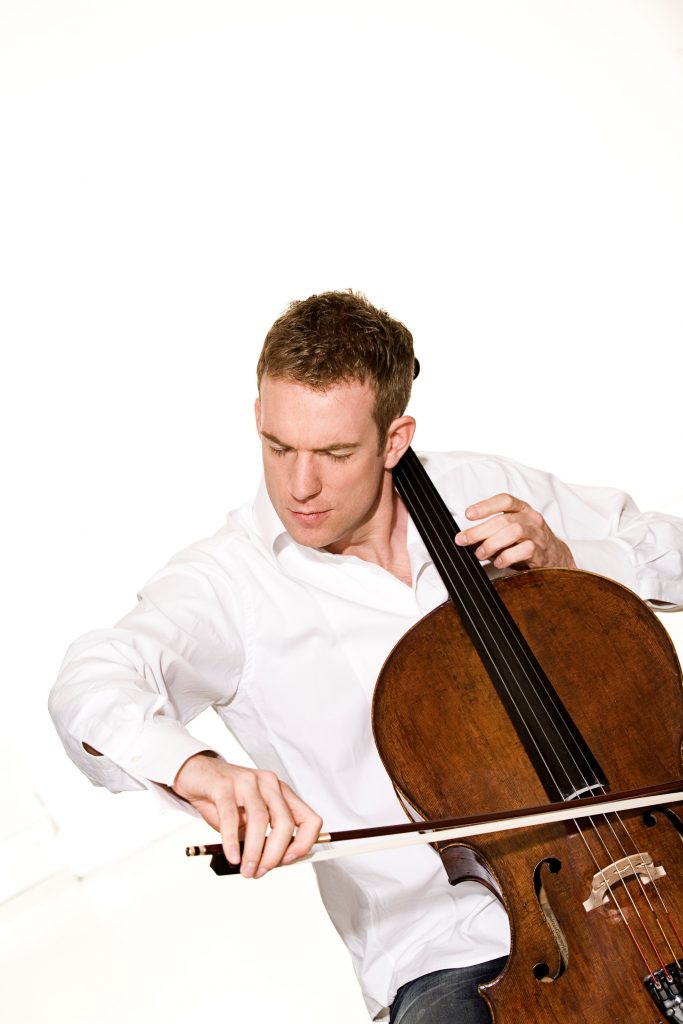Cellist Johannes Moser Thrills with Tchaikovsky “Variations on a Rococo Theme” at Mainly Mozart
Sometimes the most rewarding moments of a Mainly Mozart Festival concert occur during the performance of music by other composers. Although Saturday’s (June 16) Mainly Mozart program offered a pair of cherished Mozart Symphonies (No. 31, the “Paris,” and No. 35, the “Haffner”)—played with zeal and stylistic elan—the widely enthusiastic audience quickly rose to their feet to acclaim Johannes Moser’s brilliant solo in Tchaikovsky’s evergreen “Variations on a Rococo Theme,” Op. 33.
And the evening’s award for most audacious ensemble work came from 15 members of the orchestra who gave a vibrant account of Igor Stravinsky’s sparkling, neoclasical “Dumbarton Oaks” Concerto from 1938.Placed stage center on a small platform, Moser’s commanding, buoyant sound filled the Balboa Theatre with uncanny ease, sailing through the most complex figurations of Tchaikovsky’s concerto-like “Rococo” Variations with a keen sense of drama that never overpowered Francis and the orchestra. This Tchaikovsky piece is Moser’s calling card, the work that helped him win the Silver Medal in the 2002 International Tchaikovsky Competition and captured an additional prize for his interpretation of the work itself. In an interview ten years after that competition victory, Moser admitted that he had already performed the Tchaikovsky “Rococo” Variations some 80 times!
I particularly appreciated his judicious use of vibrato as a delicious ornament to the slow, rhapsodic variations, a technique he clearly scaled back in the swift, ornate passagework. I don’t expect to hear a more elegantly detailed account of this work, nor one that exhibits a more just balance between the composer’s passionate Romanticism and his salute to the transparent textures of Mozart, whom he held in highest esteem. Francis proved the ideal partner in this performance, deftly intertwining the orchestra’s responses with Moser’s effusions and subtly matching his nuanced phrasing.
A commission from American philanthropists Robert and Mildred Bliss, Stravinsky’s Concerto in E-flat, “Dumbarton Oaks,” is such an homage to J.S. Bach it could be subtitled Brandenburg Concerto No. 7. Propelled by scintillating lines of witty, angular counterpoint and the composer’s astringent harmonic vocabulary, the Concerto in E-flat lives up to the sponsors’ name in every way. And the actual subtitle—“Dumbarton Oaks”—is the name of the Bliss family estate in Washington, D.C. Francis had the Mainly Mozart players stand for their performance, which added to their athletic but supremely refined account.
For this 2018 installment of Mainly Mozart, Music Director Michael Francis has chosen to focus on Mozart’s landmark works from his mid-twenties. If the “Paris” Symphony, composed at age 22, is overstuffed, a cornucopia of contrasting flashy themes and tricks to surprise his audience, the “Haffner” Symphony, written only four years later, shows how much Mozart’s notions of ordering a symphony had focused. Although Francis stressed the dramatic edge of the “Haffner” and the orchestra responded with supreme finesse, the rambunctious freedom of the “Paris” proved the more rewarding of these two symphonies in this concert.
This performance was presented by Mainly Mozart on June 16, 2018, at the Balboa Theatre in downtown San Diego. The Mainly Mozart Festival continues through June 24, 2018, at this venue and other venues in San Diego County.

Ken Herman, a classically trained pianist and organist, has covered music for the San Diego Union, the Los Angeles Times’ San Diego Edition, and for sandiego.com. He has won numerous awards, including first place for Live Performance and Opera Reviews in the 2017, the 2018, and the 2019 Excellence in Journalism Awards competition held by the San Diego Press Club. A Chicago native, he came to San Diego to pursue a graduate degree and stayed.Read more…



